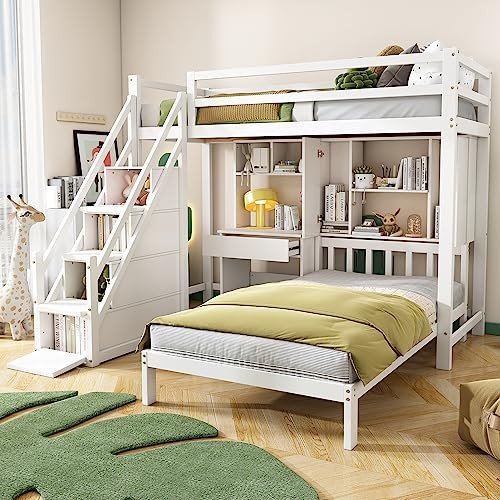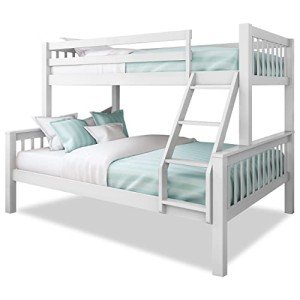You'll Never Guess This Childrens Beds Bunk's Secrets
Frank
0
4
12.26 21:14
 Adding Style to Children's Beds
Adding Style to Children's BedsBunk beds are the best solution when two or more children share a' room. They can be a space saver, and create a warm and welcoming atmosphere in the family and encourage social and intellectual development.
Bunks are typically equipped with ladders or steps that your child is able to use to climb up and down. Many bunks come with shelves or drawers which can be used to organize clothes and toys.
Size
Bunk beds are the perfect solution if you want to accommodate two kids in a single room. They are a great way to save floor space and create a relaxing, shared bedroom that promotes the idea of sleeping together and playing. They also help to avoid arguing over the time to go to bed and allow both children to get the rest they need.
The classic twin-over-twin bed is an excellent option for families who want to maximize the bedroom space. It's a great option for small or large rooms and comes with a range of design options. A lot of them include a staircase or ladder (some with an angle to make climbing to the top bunk more secure) and storage space beneath the bunks. Some even offer the option of a pull-out trundle, which provides guests with a comfortable space to sleep in during sleepovers.
Another popular choice is full-size bunks that have two twins at the bottom and the top bunk is a Queen. This is particularly true when older siblings share the same room. These are typically recommended for children who are at least six years old old and can safely climb the top bunk. But, there isn't a "one-size-fits-all" age at which to be ready for the childrens white bunk beds bed. It is important to observe your child's height as well as how they move around the furniture to determine their readiness for lofted beds.
Most bunks come with safety rails that keep the top and bottom of the mattress separated by a solid wall, preventing one child from rolling off or falling off the edge of the mattress. They also include a high guardrail on the outside of the top bunk, to provide additional protection for your children while they climb up and down. You can add additional safety features to the bunk beds for your children, such as a net to ensure they are safe when they sleep or a locking mechanism to ensure the ladder is secure while it is not in use. Most bunk beds have shelves that are ideal for storing books and toys. They are also a great method to get your children more involved in the decor of their room and to take charge of the space.
Style
If you're in the market for kids bunk beds you'll be pleased to learn that these fashionable pieces are available in a broad variety of configurations. These stylish pieces of furniture for kids bedrooms are a great way to make the most of space and style your bedroom for your child. They come in a range of configurations including classic twin-overtwins to loft beds that have an extra-large bed beneath.
In addition to the varieties of children's bunk beds, there are also many other options to choose from. For instance, certain kids bunk beds are equipped with trundle beds which can be removed for sleepovers while others have stairs that fold down from the bed's side. Of course some childrens shorty bunk beds beds are equipped with storage areas that can be used for books or toys as well as other items.
The most common type of bunk beds for children is the traditional twin over full bed, which is perfect for homes that are tight in space. This is because they allow for two kids in the same space, while taking less floor space than if you were to purchase separate beds for each child. Another alternative is the triple bunk bed that is comprised of three beds connected to a single frame. This is perfect for families with 3 kids who want to make space in their shared bedroom.
You can also be imaginative when choosing the design of your childrens double bunk beds beds for your child. Select a style that will inspire imagination and make them feel like they are sleeping in a castle or treehouse or rocket ship. These fun designs will delight your children and keep them entertained when they go to bed at the end of the night.
Alternately, you can opt for a more minimalist approach with bunk beds for kids which are simply stylish twin-sized mattresses that are stacked. They are ideal for homes with limited space. They can also be easily disassembled as your children get older, making them an excellent option for families looking to move in the future.
Stores
To maximize space and efficiency childrens wooden bunk beds beds for children have evolved to incorporate storage options. These innovative solutions maximize space and give a stylish look to the kids' room. There are bunk beds that fit every design. From sleek metal frames in contemporary finishes to exquisitely crafted wood structures.
Bunks that have a desk and drawers built-in are ideal for children who need a place to work from. They are designed with safety in mind, these beds come with built-in slats and guard rails to meet the federal requirements. Many feature drawers that lock to prevent unauthorized access and others have a sturdy ladder with anti-slip surfaces and grooved grips to increase traction and decrease the risk of falls.
Toys, clothing and books are likely to build up in a shared child's bedroom. It's important to consider the space required. If you're short on space, consider an loft bed or a bunk beds that have the option of a wardrobe, desk or dresser under the stairs. This will remove the necessity for separate storage units. You can also add more storage to your existing bunk beds by adding more baskets, or by putting up a simple drape to give the feel of a private space.
To create a larger space, bunk Childrens Beds Bunk with a staircase that have pull-out drawers can be used to store shoes, clothes, and toys. You can find beds with shelves that can be used to store blankets, pillows, or books. This is especially useful for kids who have difficulty keeping their rooms clean, since they'll have a designated place to store their night-time necessities.
There are even bunk beds for kids which fold down into a daybed, providing more space for sitting or reading. This is a great option for a shared bedroom between siblings, as both children can rest comfortably and allow the floor space to be used.
Insuring that your children keep their bunks clean may be a challenge, especially if they both want to climb up on the top. To promote good hygiene and create an environment that is more peaceful consider adding a simple curtain to the top bunk. This will help them feel like they are in their own private space, and discourage them from disturbing each other at night.
Age Rating
While bunk beds can be an ideal sleeping option for siblings sharing a room but it's important to remember that children under the age of 6 should not sleep in the top bed. They're not yet prepared for it in terms of their physical and mental development. Children younger than this age will also struggle to climb the ladder and might have difficulty staying asleep in their bunk.
If you're considering buying bunk beds for your kids it's best to check with a pediatrician for guidance. He or she can provide important information depending on the unique characteristics and requirements of your child. There is no set age when children can safely use bunk beds. However, the majority of children should be capable of doing this by the time they are six.
A great method to test your children' readiness for a top bunk is to place the night-light on both sides of the mattress. This will light up the ladder, making it easier for your kids to climb up at night. It's also a good idea to ban horseplay on the bunk bed and make sure that the mattress is supported properly to ensure that it doesn't be able to fall off.
Use only fitted sheets made for childrens bunk beds with slides beds. Make sure that the seams are sealed. Make sure the top bunk is well away from the walls and has guard rails. Not to mention, ensure that the bunk is in a space in which a fire extinguisher and an emergency call system are easily accessible.
Check if your bunk bed complies with the Consumer Product Safety Commission's (CPSC) regulations. This means that all bunk beds and parts of them are tested for sturdiness and that the manufacturer offers an Children's Product Certificate for each one.
In addition the plasticized components of the bunk bed must contain less than 0.1 percent of eight specified phthalates: di-(2-ethylhexyl) phthalate (DEHP), bifenthrinyl phthalate (BBP), butyl benzyl phthalate (DBP) diisononyl phthalate (DINP) dimethyl phthalate (DMP) and ethylene/propylene adipate co-polymer (EPPA) and dicyclohexyl (DCHP). If you are unsure whether your bunk bed meets these requirements, you should contact a third-party testing body which is approved by the CPSC for advice.

